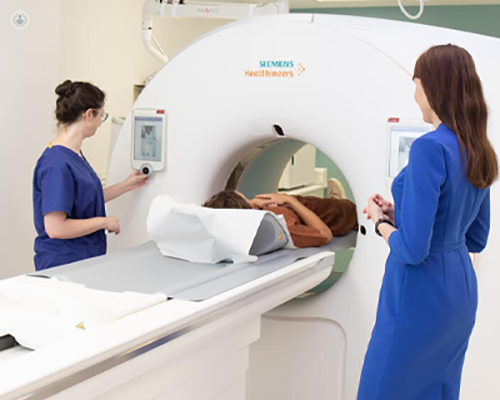Understanding non-invasive tests for cardiological chest pain
Written in association with:If you've ever experienced chest pain, you know how worrying it can be. Thankfully, there are several non-invasive tests that doctors use to get a clear picture of your heart and help determine what's causing the pain. Leading consultant cardiologist Dr Gosia Wamil has put together a simple guide to three common tests that your cardiologist might recommend:

CT coronary angiography (CTCA)
This test uses a special kind of X-ray to look at the arteries that supply blood to your heart. Think of it as taking detailed pictures of the blood vessels to see if there are any blockages or narrowing that could be causing your chest pain. It’s a quick and painless test where you lie still on a table while the scanner takes images of your heart. The results help your doctor understand if your chest pain is related to coronary artery disease.
Stress echocardiography (Stress echo)
This test checks how your heart works when it’s under stress, like during exercise. If you can't exercise, medicine can be used to make your heart beat faster, mimicking the effects of exercise. During the test, ultrasound images of your heart are taken before and after the stress. These images show how well your heart pumps blood when it’s working harder. If parts of your heart aren’t getting enough blood, this test can help identify that.
Cardiac Magnetic Resonance (CMR) stress perfusion
This test also looks at how your heart performs under stress, but it uses magnetic fields and radio waves to create detailed images of your heart. During the test, a contrast dye is injected into your bloodstream, and the CMR machine takes images of your heart as you’re at rest and then again during stress. It’s a bit like combining an MRI and a stress test. This test is particularly useful for looking at how well blood flows through the heart muscle and can detect areas that might not be getting enough blood.
Why is it important to test quickly?
When you experience chest pain, it’s crucial to test as soon as possible to determine the cause. Some conditions, like a heart attack, myocarditis (inflammation of the heart muscle), or diseases of the aorta, can be life-threatening and need immediate treatment. On the other hand, some causes of chest pain are mild and may get better on their own without any treatment.
By using these advanced imaging tests, Dr Wamil can often make a crucial distinction between life-threatening and mild causes of chest pain in a single appointment. This not only helps in getting you the right treatment fast but also puts your mind at ease, knowing you’re in good hands. So don’t wait—if you’re experiencing chest pain, get tested quickly to ensure your heart is healthy.
Do you experience chest pain, and require a non-invasive test? Arrange a consultation with Dr Wamil via her Top Doctors profile.


